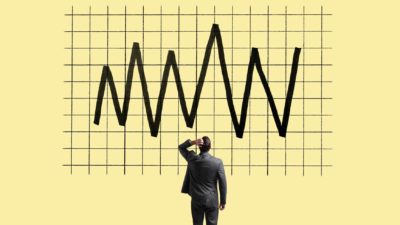It's Friday morning.
For a few minutes after I woke up, I'd blissfully forgotten Russia had invaded Ukraine, and the world's financial markets were in turmoil.
Then, I remembered.
First, an overwhelming sadness for the people facing these unprovoked attacks.
Then, hesitation as I wondered what had befallen the US stock market overnight, an impact that would be foisted on us when the ASX opened today.
I was a little surprised – though not much – to see the major US index, the S&P 500, up 0.25%.
Not because I predicted it… economic predictions are for people who failed at meteorology.
I wasn't much surprised because the market's wild gyrations are regularly overblown… or just plain wrong.
Markets have always overreacted. And, though I stand to be corrected, I almost literally mean 'always'.
Think of the bounceback from the COVID crash. The recovery from the GFC. The two dozen other reasons to panic over the last decade or so.
Frankly, a kid full of red cordial is calmer than some days on the Australian and global markets.
And those kids don't get handsome six-figure salaries to pretend they know what's going on!
Which isn't to say the situation in Ukraine isn't serious.
It is deadly serious for the people there. And it has potentially serious, long-term implications for the rest of the world.
But you might be surprised to know this, from Ben Carlson of US financial advisory firm Ritholtz Wealth Management:
"From the start of WWII in 1939 until it ended in late 1945, the Dow was up a total of 50%, more than 7% per year. So, during two of the worst wars in modern history, the US stock market was up a combined 115%,"
Will history repeat?
I have no idea.
But it's far from a foregone conclusion that war in Ukraine will be a terrible thing for the world's stock markets.
(Even as I type that, I feel uncomfortable: the people in Ukraine are suffering and I'm talking about whether shares will go up or down. But, given that's my job, and the role of the business I work for – and given that the markets are open and trading, it's appropriate. It's just also worth keeping a little perspective – it's a pretty low priority relative to what's happening there.)
Coles will sell groceries. Xero will help you do your accounts. CSL will provide blood plasma products and vaccines. Westpac will process transactions.
None of those businesses are likely to be anything but tangentially, and only very slightly, impacted.
And if their shares fall anyway?
Well, if you liked the value proposition at higher prices, and the business is no weaker, you should like lower prices even more if you're adding to your portfolio.
And if you're not?
Well, as long as you've heeded our advice to have cash on the sidelines for short- and medium-term living expenses in retirement, you shouldn't be a forced seller… which means short term price volatility is of exactly zero consequence.
The ASX is up in early trade.
Of course, sentiment might shift, news might break, or something else might cause the market to fall.
I don't know.
Neither do you.
And nor does anyone else.
So why would you or I bother asking 'the market' what it's thinking right now?
Unless you're selling today, why would you worry if your portfolio was down?
And if you have some cash to invest, and you liked higher prices, shouldn't you like lower prices more?
I mean, if the scotch fillet is on special at Woolies this arvo, I don't throw out the steak I have in the fridge because Woolies says it's suddenly not worth as much.
Why would I do that with shares?
Exactly.
Now, a quick change of tack, if you'll allow me.
Last Friday, I wrote about being the luckiest bloke in the world.
I made a quiet deal with myself that from there on, I'd make Fridays a day where I'd try to share a message of optimism.
Maybe slightly harder today than last Friday, but we shouldn't let the (sometimes hard to avoid) exceptions dissuade us from the reality of better and brighter things elsewhere and over time.
I'm not going to let the current darkness blind me to the light.
Indeed, one of my favourite quotes is "All the darkness in the world cannot extinguish the light of a single candle". The provenance is disputed, but it's a wonderful sentiment.
Or the example of Fred Rogers — known to generations of Americans as "Mr Rogers" who, as the New York Times describes:
"… famously said he was always comforted by something his mother would tell him during times of disaster: 'Look for the helpers. You can always find people who are helping'."
Pollyanna? Froth and bubble?
Maybe, but I don't think so.
The story of the human race is the story of progress. Imperfect, and not a straight line, but progress, nonetheless.
It's that progress that has dramatically raised living standards and life expectancy and alleviated incredible amounts of human suffering.
And it's that progress that has underpinned more than a century of wealth creation, inside and outside the world's stock markets.
The headlines carry the big, sudden and impactful bad news. It's real alright, and worth reporting.
But they don't carry the smaller stuff. Stories of the internet's decades-long invention before it became a phenomenon. Stories of the legion of scientists working to cure and treat diseases, past, present and future.
Contrast, if you will, the completely justifiable run of headlines and awful stories in the early years of the AIDS epidemic, with the current situation of eminently treatable management of HIV infection.
How many headlines about the former? And how many about the latter?
Exactly.
And it's repeated in all spheres of life. The greatest achievements of humanity are not the things of all-caps headlines. They are the slow, steady, incremental stories of progress, achieved over many, many years of hard work, graft, and not just a little luck.
Yes, we should, of course, recognise and deal with the evil in the world. We shouldn't block our eyes and ears, nor focus only on the good stuff.
But we should never lose sight of the wonderful progress we've made, are making, and will continue to make.
Because that is the story of the 20th and 21st centuries. And will be, I think, the story for many centuries to come, too.
I hope the war in Ukraine comes to a swift end. It's hard not to be weighed down by the tragedy.
But we mustn't dwell only in the darkness, either. There is far, far more light. And progress depends on us believing in, and working for, a better tomorrow.
Let's do that.
Fool on!









